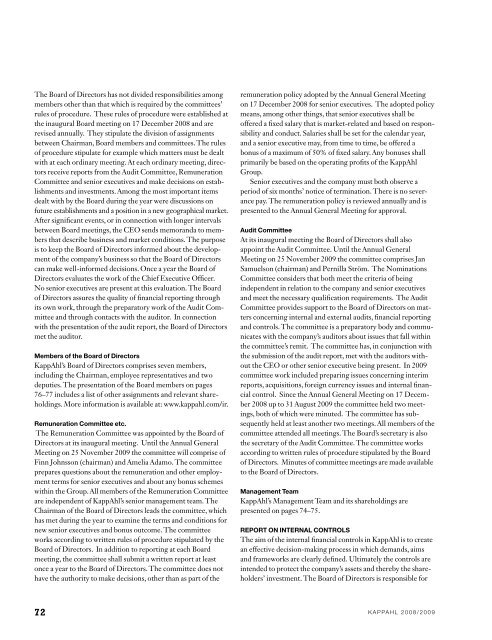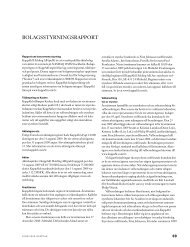We - KappAhl
We - KappAhl
We - KappAhl
You also want an ePaper? Increase the reach of your titles
YUMPU automatically turns print PDFs into web optimized ePapers that Google loves.
The Board of Directors has not divided responsibilities among<br />
members other than that which is required by the committees’<br />
rules of procedure. These rules of procedure were established at<br />
the inaugural Board meeting on 17 December 2008 and are<br />
revised annually. They stipulate the division of assignments<br />
between Chairman, Board members and committees. The rules<br />
of procedure stipulate for example which matters must be dealt<br />
with at each ordinary meeting. At each ordinary meeting, directors<br />
receive reports from the Audit Committee, Remuneration<br />
Committee and senior executives and make decisions on establishments<br />
and investments. Among the most important items<br />
dealt with by the Board during the year were discussions on<br />
future establishments and a position in a new geographical market.<br />
After significant events, or in connection with longer intervals<br />
between Board meetings, the CEO sends memoranda to members<br />
that describe business and market conditions. The purpose<br />
is to keep the Board of Directors informed about the development<br />
of the company’s business so that the Board of Directors<br />
can make well-informed decisions. Once a year the Board of<br />
Directors evaluates the work of the Chief Executive Officer.<br />
No senior executives are present at this evaluation. The Board<br />
of Directors assures the quality of financial reporting through<br />
its own work, through the preparatory work of the Audit Committee<br />
and through contacts with the auditor. In connection<br />
with the presentation of the audit report, the Board of Directors<br />
met the auditor.<br />
Members of the Board of Directors<br />
<strong>KappAhl</strong>’s Board of Directors comprises seven members,<br />
including the Chairman, employee representatives and two<br />
deputies. The presentation of the Board members on pages<br />
76–77 includes a list of other assignments and relevant shareholdings.<br />
More information is available at: www.kappahl.com/ir.<br />
Remuneration Committee etc.<br />
The Remuneration Committee was appointed by the Board of<br />
Directors at its inaugural meeting. Until the Annual General<br />
Meeting on 25 November 2009 the committee will comprise of<br />
Finn Johnsson (chairman) and Amelia Adamo. The committee<br />
prepares questions about the remuneration and other employment<br />
terms for senior executives and about any bonus schemes<br />
within the Group. All members of the Remuneration Committee<br />
are independent of <strong>KappAhl</strong>’s senior management team. The<br />
Chairman of the Board of Directors leads the committee, which<br />
has met during the year to examine the terms and conditions for<br />
new senior executives and bonus outcome. The committee<br />
works according to written rules of procedure stipulated by the<br />
Board of Directors. In addition to reporting at each Board<br />
meeting, the committee shall submit a written report at least<br />
once a year to the Board of Directors. The committee does not<br />
have the authority to make decisions, other than as part of the<br />
72<br />
remuneration policy adopted by the Annual General Meeting<br />
on 17 December 2008 for senior executives. The adopted policy<br />
means, among other things, that senior executives shall be<br />
offered a fixed salary that is market-related and based on responsibility<br />
and conduct. Salaries shall be set for the calendar year,<br />
and a senior executive may, from time to time, be offered a<br />
bonus of a maximum of 50% of fixed salary. Any bonuses shall<br />
primarily be based on the operating profits of the <strong>KappAhl</strong><br />
Group.<br />
Senior executives and the company must both observe a<br />
period of six months’ notice of termination. There is no severance<br />
pay. The remuneration policy is reviewed annually and is<br />
presented to the Annual General Meeting for approval.<br />
Audit Committee<br />
At its inaugural meeting the Board of Directors shall also<br />
appoint the Audit Committee. Until the Annual General<br />
Meeting on 25 November 2009 the committee comprises Jan<br />
Samuelson (chairman) and Pernilla Ström. The Nominations<br />
Committee considers that both meet the criteria of being<br />
independent in relation to the company and senior executives<br />
and meet the necessary qualification requirements. The Audit<br />
Committee provides support to the Board of Directors on matters<br />
concerning internal and external audits, financial reporting<br />
and controls. The committee is a preparatory body and communicates<br />
with the company’s auditors about issues that fall within<br />
the committee’s remit. The committee has, in conjunction with<br />
the submission of the audit report, met with the auditors without<br />
the CEO or other senior executive being present. In 2009<br />
committee work included preparing issues concerning interim<br />
reports, acquisitions, foreign currency issues and internal financial<br />
control. Since the Annual General Meeting on 17 December<br />
2008 up to 31 August 2009 the committee held two meetings,<br />
both of which were minuted. The committee has subsequently<br />
held at least another two meetings. All members of the<br />
committee attended all meetings. The Board’s secretary is also<br />
the secretary of the Audit Committee. The committee works<br />
according to written rules of procedure stipulated by the Board<br />
of Directors. Minutes of committee meetings are made available<br />
to the Board of Directors.<br />
Management Team<br />
<strong>KappAhl</strong>’s Management Team and its shareholdings are<br />
presented on pages 74–75.<br />
REPORT ON INTERNAL CONTROLS<br />
The aim of the internal financial controls in <strong>KappAhl</strong> is to create<br />
an effective decision-making process in which demands, aims<br />
and frameworks are clearly defined. Ultimately the controls are<br />
intended to protect the company’s assets and thereby the shareholders’<br />
investment. The Board of Directors is responsible for<br />
Kappahl 2008/2009





